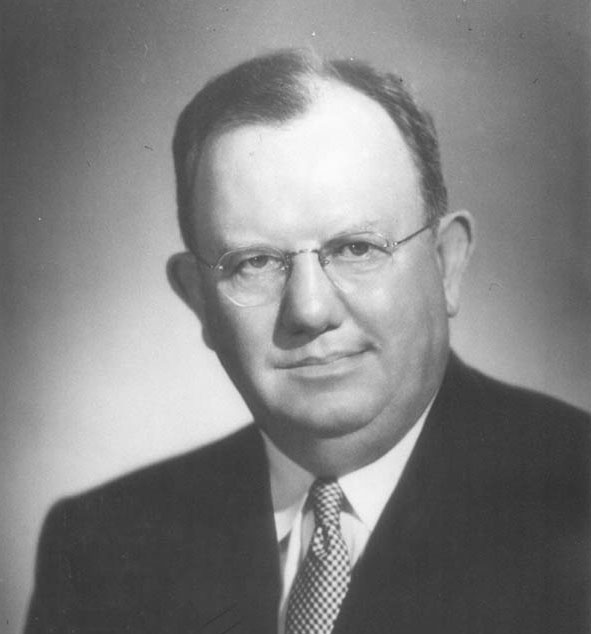Homer E. Capehart
Homer Earl Capehart (born June 6, 1897 in Jefferson Township , Pike County , Indiana , † September 3, 1979 in Indianapolis , Indiana) was an American politician who represented the state of Indiana in the United States Senate.
Life
Childhood and youth
Homer Capehart was born on a farm, the eldest of four children of Alvin and Susan Capehart. From an early age, like his siblings, he had to work on the family farm to contribute something to the family's financial livelihood. In 1909 the family moved from Pike County to Daviess County , where he was a student at Longfellow Consolidated School . He then attended high school in Washington, Indiana. In April 1916 he moved briefly to Polo ( Illinois ), where he had found work on a milk-producing farm. With the money saved in this way, Capehart also financed his college studies . After graduating from college, he worked, among other things, as a baking powder agent and as a landscaper .
In April 1917 he joined the United States Army as a soldier, serving as a soldier in the 12th Infantry Division. However , he was not involved in active combat operations in Europe . In 1919 he was honorably dismissed with the rank of quartermaster . He then moved to Rockford, Illinois, where he worked as a waiter in a restaurant for a short time.
On January 19, 1922, he entered the state of marriage in Green Bay ( Wisconsin ) with the teacher Irma Viola Mueller. The couple had three children, two sons and a daughter. Her youngest son Thomas came as one of 37 victims in January 1960 board of Avianca Flight 671 died when the plane during landing at Montego Bay ( Jamaica crashed).
Career
The Capehart family led a wandering life in the 1920s and early 1930s. In nine years they lived in nine US states. Capehart was considered an all-round talent who pursued a variety of jobs. Mostly, however, he was a sales representative for agricultural equipment, including tractors , milking machines and plows . Most recently, he was sales director for the Holcomb and Hoke Manufacturing Company , based in Indianapolis, Indiana. In 1927 he founded the Capehart Corporation , a company specializing in the manufacture and sale of radios and cameras . In 1932, Capehart became vice president of the Rudolph Wurlitzer Company in North Tonawanda , a small town in Niagara County , New York . In the mid-1930s he also acquired the Packard Piano Company , a company that made all kinds of musical instruments .
Political activity
In the 1930s, Capehart became more politically active. Since he did not agree with the work of the Democratic Party under US President Franklin D. Roosevelt , he joined the Republican Party . In 1938 he founded the Republican Cornfield Conference on the grounds of his farm in Indiana, which was attended by around 55,000 party members. In the presidential election of 1940 , the Republicans wanted to nominate Capehart as their top candidate, but the latter refused. He announced his election recommendation and support for Wendell Willkie , also from Indiana .
During the Second World War , he had many of his operations, including the Packard Manufacturing Company , produce essential war goods for the army and navy. Through the acquisition and merger of other companies, he had created a corporation that received the Army-Navy "E" Award five years in a row , an award that honored civil companies that were particularly committed to war production.
Capehart held his first electoral office from 1942, when he was elected party leader of the Republicans in the 7th congressional constituency.
Two years later, in 1944, he successfully ran for the seat in the US Senate. On January 3, 1945, he took up his new office in the federal capital Washington, DC. Homer Capehart was soon one of the most influential Republican senators, serving on parliament's economic and foreign affairs committee. In this function he was a guest in numerous Eastern European countries, including Poland and Czechoslovakia . His opposition to communism was reinforced by his visits to the Soviet Union . Rumors that he helped his counterpart Joseph McCarthy in the so-called McCarthy era have persisted to this day. He also traveled through Latin America and advised Congress to invest heavily in this part of South America in order to counteract the communist tendencies in these states. Capehart was one of the few members of Congress who strongly condemned the atomic bombing of Japan in 1945 . Domestically, Capehart was committed to the creation of new jobs, the strengthening of small and medium-sized enterprises and, knowing about his origins, the promotion of farmers and farmers.
Late life and death
After his electoral defeat in 1962 by the Democrat Birch Bayh , Capehart retired to Indianapolis. His family ran a small farm here and was also successful in the real estate sector. He also worked as a management consultant in South America.
In July 1979, Capehart broke his hip . After the operation, he could never fully recover. He died two months later, at the age of 82.
Web links
- Homer E. Capehart in the Biographical Directory of the United States Congress (English)
| personal data | |
|---|---|
| SURNAME | Capehart, Homer E. |
| ALTERNATIVE NAMES | Capehart, Homer Earl (full name) |
| BRIEF DESCRIPTION | American politician |
| DATE OF BIRTH | June 6, 1897 |
| PLACE OF BIRTH | Jefferson Township , Indiana |
| DATE OF DEATH | 3rd September 1979 |
| Place of death | Indianapolis , Indiana |

